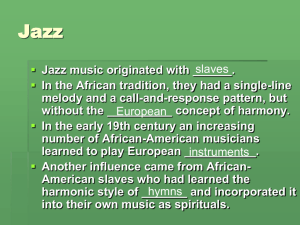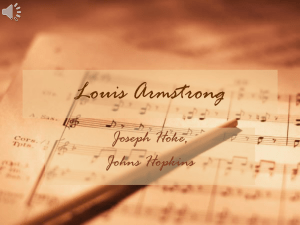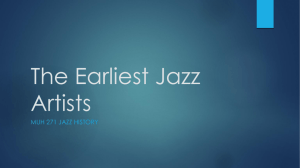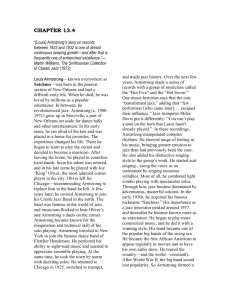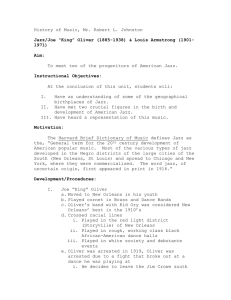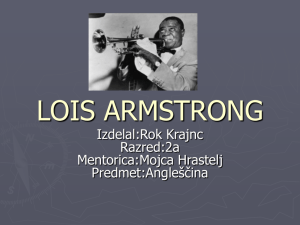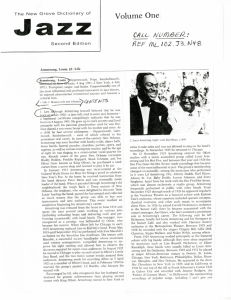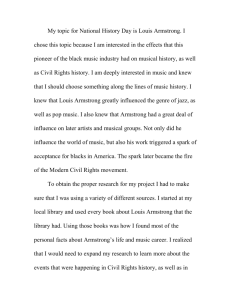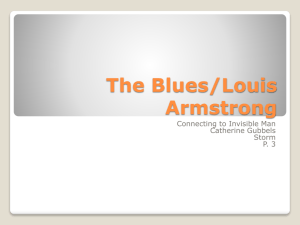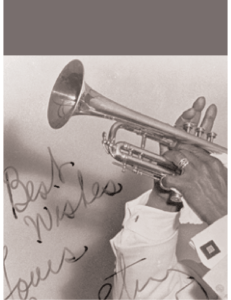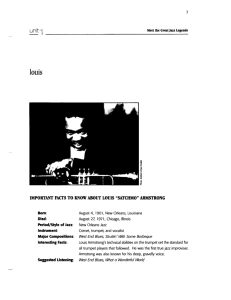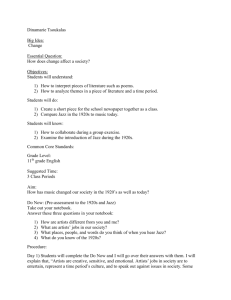Chapter 6
advertisement
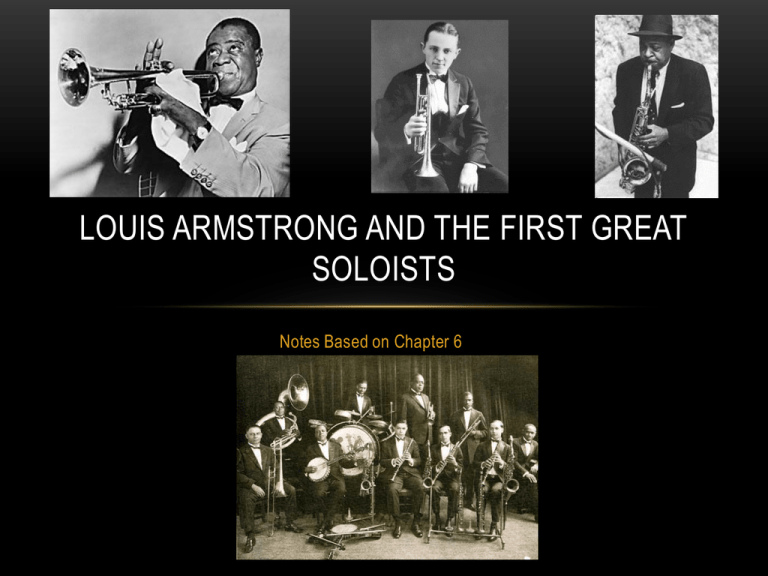
LOUIS ARMSTRONG AND THE FIRST GREAT SOLOISTS Notes Based on Chapter 6 JOE “KING” OLIVER • Born in or near New Orleans in 1885. • Began playing with brass bands in New Orleans around 1908. • First called “the King” by Kid Ory in 1917, although possibly already “past his prime.” IN CHICAGO • Moved to Chicago in 1919 to play with Bill Johnson’s Original Creole Orchestra. • King Oliver’s Creole Jazz Band • formed in 1922. • 1923 recordings introduced Louis Armstrong to the world. • group fell apart in 1924. POOR BUSINESS DECISIONS • Rejected offer to open Cotton Club as house band. • Eventual move to New York probably too late; by 1925 his style had been superseded by Armstrong’s. • (problems with teeth and gums interfered with ability to perform). • final "mistake" was an extended tour of the South beginning in 1931. By 1936 he had ended up in Savannah selling fruit and vegetables and sweeping out a pool parlor. He died there in April 1938. CONTRIBUTIONS • he "had a repertory of expressive deviations of rhythm and pitch, some verging on theatrical novelty effects and others derived from blues vocal style . . .” • “He frequently used timbre modifiers of various sorts and was especially renowned for his wa-wa effects, as in his famous threechorus solo on ‘Dipper Mouth Blues’.“ • “Oliver was a good band leader, and his cornet playing was well integrated into the ensemble. By 1925 his performance style had been superseded by Louis Armstrong, but he had a significant impact on Bubber Miley as well as on Armstrong himself.” LOUIS ARMSTRONG • “Louis Armstrong is the single most important figure in the development of jazz.” • 1st virtuoso jazz soloist (arguably with Sidney Bechet). • Influential as both vocalist and instrumentalist. INNOVATIONS • Blues – established the blues scale (pitches) and blues feeling as jazz’s harmonic foundation • Improvisation – established jazz as a soloist’s art form • Singing – introduced a true vocal jazz style (pitch, time, imagination); “scat singing” • Repertory – showed that Tin Pan Alley/pop music could be performed in a jazz style • Rhythm – he “taught the world to swing” EARLY YEARS • Although Armstrong apparently believed that he was born on July 4, 1900, a birth certificate shows the date as August 4, 1901. • sent to reform school at age 12, where he learned to play cornet. • took lessons from King Oliver and took Oliver’s place in Kid Ory’s band when Oliver moved to Chicago. • played with Fate Marable's band from 1919 to 1921 on riverboats. CHICAGO AND NEW YORK • Armstrong moved to Chicago in 1922 to play with Oliver's Creole Jazz Band. • made the first of his famous Gennet recordings with Oliver in April 1923. • moved to New York to play with Fletcher Henderson's Orchestra in September 1924; also recorded with several blues singers including Ma Rainey and Bessie Smith and with Sidney Bechet. RETURN TO CHICAGO • made first Hot Five and Hot Seven recordings. • “Weather Bird” released in 1930. • Briefly moved to Los Angeles in 1930 to form Louis Armstrong and his Sebastian New Cotton Club Orchestra, but he returned to Chicago in 1931. • By the 1940s Armstrong's style of jazz was losing popularity, and Armstrong had no interest in the newer styles. He traveled extensively with an All-Star band during the revival of interest in New Orleans and Dixieland. • recorded "Hello Dolly“ in 1963, "What A Wonderful World“ in 1968. • On July 6th 1971, Armstrong died in his sleep. OTHER SIGNIFICANT EARLY ARTISTS • Leon “Bix” Beiderbecke • Frankie Trumbauer • Coleman Hawkins (will discuss after mid-term)
